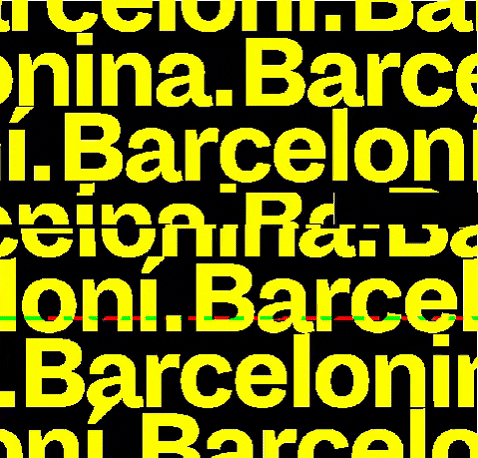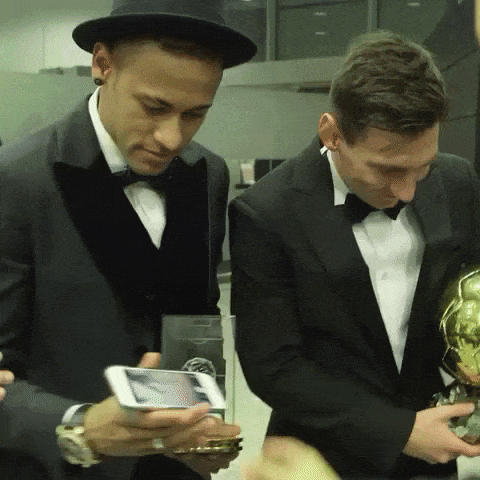16 Spotify-Barcelona angles; The 300 new brands you should be talking to; Data consultancy as culture war; TMW your next door neighbour gets a gong; Fun with naming rights; Streaming commentaries
The newsletter of the podcast
16 ways in to the Spotify Barcelona story
It always feels a bit odd when big digital brands buy old school media inventory. (See also TikTok’s big push in to TV advertising and rugby sponsorship). Something discussed on this week’s pod with Alex Charkham of Fuse and Bhav Balvantrai of Omnicom. According to Omnicom’s media research, 300 new brands entered the TV advertising market in the UK since Covid. Many of these, like Spotify, can be defined as digital brands, or companies for whom the internet is the main marketplace - Cazoo, Cinch, Getir…etc. This digital business model is much envied by some in the sports marketing space because it’s a clean example of D2C - direct to consumer.
So when Spotify comes in to buy up Barca’s entire sponsorship inventory, it messes with people’s heads: Why are cool kids lowering themselves with something as mundane as brand awareness? (Btw, media driven brand awareness is often looked down on by sponsorship agencies who tend to get their money from non-media activation budgets).
Beware the Either/Or trap. The debate on data in sport has evolved in to an esoteric culture war, with first party D2C evangelists on one side and old school sponsor and media sales vets on the other, with the latter pointing to two decades of double digit rights revenue growth and wondering how they came to be the bad guys. The Spotify Barcelona deal feels like a moment which reinforces the benefits of sport sponsorship’s proven ability to build real world fame.
Whole careers can pass by waiting for football to change. An adaptation of the trading adage, ‘the market can stay irrational longer than you can stay solvent’. The lot of the First Party Data crowd is to moan about the business of football, which is deemed to be unresponsive to the charms of someone offering to deep clean their CSV files.
Football will always take the cheque. Why wouldn’t you? TV money is like Putin’s gas money. It’s thrown a mantle over all the inefficiencies, all the delays, we’ll get back to you on that, let’s park that till the summer bullshit responses you get whenever you approach a football club with a business proposal. It’s not just football. The past two decades has seen sport framing fan data as they did media rights: Something to be packaged and sold to the highest bidder. There’s a counter factual history that sees Sport Inc keeping the money within its own walled garden instead of allowing others to monetise their own fans: Facebook (fan engagement), Sportradar and Genius Sports (betting), Fanatics (merchandise) and Sky, Disney, Amazon etc (media).
Counting Barcelona’s email addresses is like obsessing over how many words Shakespeare wrote. It sort of misses the point.
Because it was Spotify, a story grew this week that it was all a fan data play, wherein the streamer will in some way inherit the football club’s fans as part of the deal. Back in the real world however….at this price point, the value of FCB’s database of reportedly 3million emails is marginal in the scheme of things (caveat: Either/Or Trap above).
How many fans do Barcelona have?
There’s a marked disparity between the two available numbers. Three million emails v 300 million+ claimed fans across social. This goes back to an old question: what is a fan, really? How do you measure it? And is 3 million too low or 300 million too high?
Either way, it’s not about the emails…
Alex Balfour, via WhatsUP: The database issue is a bit of a red herring. A data record is only as useful as the basis on which it was collected and the governance which determines how it can be used. Even a season ticket holder who might accept and open regular communication from the club may not be eligible for commercial messaging from a sponsor based on application of GDPR and internal rules on permissions, engagement and churn. More importantly from my experience they will likely be unresponsive to commercial communication unless its very relevant to them in any case (and that includes sports promotions). For a mass market brand the Barca brand and content are far stronger levers to drive attention and engagement in digital environments than a data record.
The use of the sponsored entity's first party data has a limited practical application in sponsorship. Almost every sports business has a d2c offer based around data in the form of tickets and some merch. In that context 3m database is not amazing but its rational.
As publishers Sky, Amazon and Disney's relationships with sports and entertainment rights holders and/or development of their own content allows them to build first party data and drive their business with direct consumer sales. Sport cedes that ground to them in return for fees and the strongest sports brands leverage competition to command fees far higher than they could generate by going direct to market. Likewise consumer brands and sponsorship.
9. ‘It’s a shame they can’t both lose’ said Henry Kissinger about the Iran-Iraq war. Bit of a jump, but FC Barcelona and Spotify share a brand characteristic, which can loosely be described as a sort of cynical, phoney purpose. You’ll recall there was a time when Barca was deemed more than a club, all UNICEF and tika taka. That feels a long time ago. Likewise, Spotify is a difficult brand to pin down in terms of sentiment - Swedish social democracy and music’s post-Napster white knight has shifted to Joe Rogan-inspired white supremacy meets Bezos-lite exploitation of the little guy. Who are the good guys again?
10. Build: How are these two brands viewed by people who don’t (yet?) pay subs for football or music? This is a demographic and geographic question - note the reference to new territories in the PR this week - and it leads to a host of other questions. Such as:
11. How old is a Barca fan?
How damaging has been the exodus of talent, such as Messi and Neymar on the club’s connection to younger football fans? Who's paying Spotify’s subs? If it mirrors sport, it's older people, with Gen Z expecting content for free or scrounging off their parents. This goes back to purpose. We're often told that younger people are more discerning in their choices and want companies to do 'the right thing'. How does this square with Spotify's business model and its podcast output?
12. Today, Spotify is the music business.
Simon Bazalgette (UP208): “Spotify is the music business. Most of the revenues music labels make come from Spotify, it’s Spotify who knows what people like, it’s got the data and the relationships. The artists don’t have it, the labels don’t have it. The record companies aren’t really selling anything anymore, they were never direct to consumer, instead pushing product via wholesalers”.
13. But does this deal indicate internal concern, even desperation, about Spotify’s future? A point made by Shaun Whatling via WhatsUP, about the lack of differentiation in the music streaming marketplace. Over a ten year window, would you bet on Spotify to hold off Apple and/or Amazon to win out in music/audio?
Shaun Whatling, via WhatsUP: They (Spotify) don’t have first mover advantage, they don’t have a larger brand and distribution platform like Amazon and Apple, they didn’t leverage their temporary dominance in podcasts - yes they need exposure but they also need a content and creative point of difference which they alluded to in the PR yesterday.
More: This is a very deep dive in to how Spotify’s business actually works.
14. Look who’s talking: Fronting Spotify’s comms was Alex Nordstrom. He’s not from the marketing team, but is responsible for biz dev and subscriber growth, which suggests they see this deal as a means to use awareness to drive conversion for subs volume. User growth is declining as cost of acquisition is going up.
15. What’s the difference between naming rights and title rights? Spotify Camp Nou is what nobody will now call the ground. So more like Wembley Connected by EE than The O2. It’s a nuance but can be significant when it comes to thorny question as to whether the brand’s name will be carried in the day to day fan lexicon. The answer to that question is no, so it’s a shit load cheaper.


Richard Ayres, via WhatsUP: The Oval has struggled to be called The Kia Oval. A few years ago I discovered Surrey CCC had done a nice little thing to influence the media… the press wifi password was: pleasecallusthekiaoval.
Tim Crow, via WhatsUP: I was involved in the Foster’s Oval deal which got it all started for Surrey and was one of the first UK naming rights deals. One abiding memory is visiting the BBC TV Comms box on the first day of the Oval Test that year, and seeing that the BBC producer at the time had had a sign taped to the window, in the eyeline of Richie Benaud et al, which read ‘This is THE OVAL’.
16. Where does sport play in the great audio streaming battle?
On a side note, speaking of Spotify and its recent push into sports, has anybody thought about the Swedish company getting into audio commentary rights to sports events for further differentiation? In the US and UK, traditional radio stations such as Westwood One, Sirius XM, ESPN Radio, BBC 5Live and talkSPORT continue to have a firm grasp on such rights. A big difference to audiovisual rights though: the explosion in rights fees paid has not happened yet. At the same time, we start to talk about the "share of ear" amidst the rise of podcasting. Even the big technology companies have occasionally already ventured into the space of sports audio rights: In 2017, Amazon acquired the audio rights to the German Bundesliga and DFB Pokal through the 2020/21 season for its Amazon Music service. The obvious misfit between Spotify, or any other digital-first company for this matter, and audio sports rights though: marrying a new distribution technology (i.e. streaming) with a broadcast format that is most-used among older fans who continue to live in the analogue distribution system (i.e. FM/AM radio).
And finally…Trapital on the strategy behind the JayZ mobile launch. Spoiler: It’s really good.
Senior Account Manager - Commercial - Seven League
Blurb:
Seven League is a fast-growing digital sports agency with over 50 full-time staff with additional associates in 14 European countries. We are part of the Endeavor Group which includes companies such as IMG, UFC and 160/90. We are looking for a commercially-minded Senior Account Manager - among other positions - to take on a wide-ranging role working directly with clients, national and international, reaching all sectors of the sports business.
If you have extensive and broad digital experience along with a passion for sport and its ability to positively impact society then get in touch.
Apply via this link: Seven League Job
TMW your next door neighbour gets an OBE
This has got to be good for house prices, surely.











